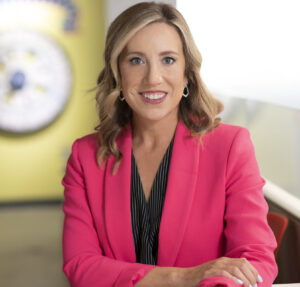Bringing a coaching culture to your organization can be a gamechanger
Coaching can make you a better manager, a better direct report, a better partner and a better leader to shape your organization’s culture.

These days, it is particularly difficult to nurture a strong, healthy organizational culture with clear values and norms that support your staff at every level. Almost three years of COVID have shown us how delicate, but critical, company culture can be. Culture, sometimes even before mission, can make the difference between retaining and attracting the best talent.
Whether your team is fully remote, hybrid, or in-person, every single team member contributes to your organizational culture. While leadership sets the tone, an organization’s culture is determined by a deliberate choice that each individual makes to commit to the company’s shared values. One way to set a strong foundation for an organizational culture where everyone can thrive is to bring a coaching mindset to your organization.
As a communications professional who recently became a leadership coach, I see every day how valuable coaching skills are in my senior leadership role. Coaching has made me a better manager, a better direct report, a better leader and a better partner with my CEO as we work to shape our organization’s culture.
Coaching builds empathy
Imagine if every team member approached their colleagues with the belief that they are all uniquely resourceful, creative, and whole. This is one of the key pillars in the Co-Active Coaching approach, a mindset transforms the way we approach others. It opens us up to a level of empathy that reminds us we are working with human beings, not robots.
Whether a mistake is made, a deadline is missed or you just don’t vibe well with a coworker, leading with empathy is the most constructive choice — even if it can be the hardest. An empathetic team is also more likely to be an inclusive team wherein employees feel they can be creative and own their workflows with confidence.
Team cohesion increases
We’ve all heard how important vulnerability is in leadership. The truth is, where you find vulnerability you often find empathy, too.
A coaching mindset encourages vulnerability by encouraging you to accept both your strengths and your areas for improvement. Not just your own, but also the strengths and areas for improvement of everyone you work with.
When leadership brings empathy and vulnerability to the way they manage their teams, they approach feedback and professional development from a place of abundance instead of deficit. This breeds empathetic managers who are invested in the success of their direct reports while also recognizing the individuality of each person on their team.
Self-awareness skyrockets
One thing coaching will always bring out in people is increased self-awareness. This is often layered with a growth mindset and a lean towards self-acceptance that makes for well-rounded and resilient employees.
The more you learn about who you are as a leader — and who you want to be— the more knowledgeable you become about your own strengths, tendencies, and areas for growth. This makes you a better coworker because you can more easily identify opportunities for professional growth and are better equipped to navigate conflict smoothly. Additionally, you become a decisive, thoughtful, collaborative leader who can internalize feedback as well as give it in a compelling, impactful way.
Many of you might already see a coaching culture showing up at your workplaces, and that’s fantastic. Leadership and executive coaching are having their time in the sun right now and every department, not just human resources, should explore how coaching can take their work to the next level.
This can be done in a lot of ways — from hiring leadership coaches as part of your employees’ professional development to encouraging your managers to take coaching courses to improve their leadership abilities. As you plan for the year ahead, make sure you find the best way to bring a coaching culture to your company.
Danielle Veira is a DC-based strategic communicator and leadership coach. She is the founder and CEO of Minerva’s Legacy Consulting Group and the senior vice president of communications, marketing, and membership at Advocates for Community Health.






